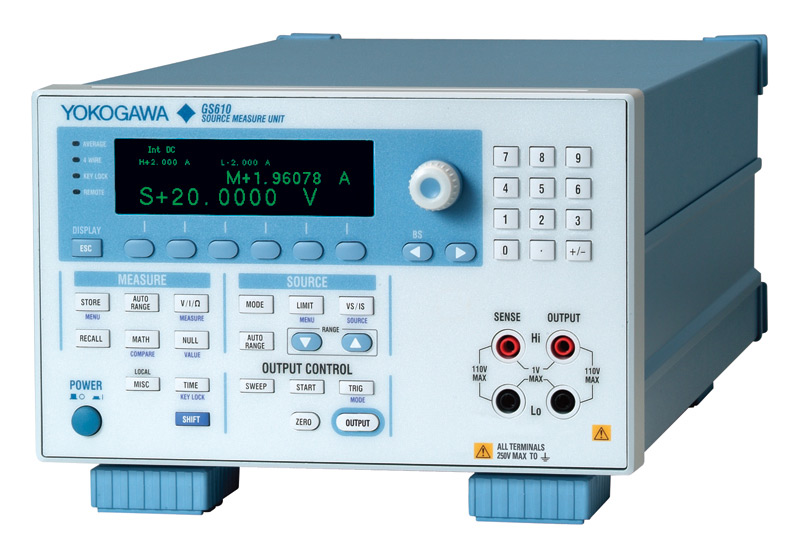GS610 Source Measure Unit
The GS610 is a highly accurate and highly functional programmable voltage/current source that incorporates voltage/current generation and measurement functions. The maximum output voltage and current are 110 V and 3.2 A, respectively. Evaluation of over a wide range of basic electrical characteristics is possible because the GS610 can operate as a current source or a current sink.
 |
|
This source measurement unit is fully performing to your high capacity needs and includes remote control and easy file operation for ease of use.
- Source and sink operation up to 110 V/3.2 A (four-quadrant operation)
- Basic accuracy: ±0.02% (DC voltage generation)
- Sweep output at up to 100-µ intervals
- Comes with abundant sweep patterns (linear, logarithmic, and arbitrary)
- Stores up to 65535 points of source measure data in the internal memory
- Remote control and FTP using Web server function (Optional)
- Easy file operation with the USB storage function
Voltage/Current Generation and Measurement Range
Four-dimensional operation with source operation (current source) and sink operation (current sink) is possible at up to 110 V, 3.2 A, and 60 W.
The output and measurement resolutions are 5.5 digits.
Voltage generation/measurement range: 200 mV to 110 V
Current generation/measurement range: 20 µA to 3.2 A
Maximum output current:
±3.2 A & (at an output voltage of ±12 V or less)
±2 A (at an output voltage of ±30 V or less)
±1 A (at an output voltage of ±60 V or less)
±0.5 A (at an output voltage of ±110 V or less)
Generation and Measurement Functions
The GS610 is made up of a constant current source, a constant voltage source, a voltmeter, and an ammeter. Each function can be combined into numerous operation modes.
Operation modes:
- Voltage generation/current measurement (VS/IM);
- Voltage generation/voltage measurement (VS/VM);
- Current generation/voltage measurement (IS/VM);
- Current generation/current measurement (IS/IM);
- Voltage generation (VS);
- Current generation (IS);
- Resistance measurement (VS/IM or IS/VM)
Additionally, control and measurement using a two-wire system or a four-wire system are possible by switching local sensing and remote sensing internally.

Various Operation Modes
The voltage/current generation block of the GS610 operates in DC generation mode or pulse generation mode. Four operation modes-continuous output, linear sweep, log sweep, and program sweep-are available for each generation mode. In program sweep mode, the user can define an arbitrary sweep pattern. The output level can be changed at a minimum of 100 µs intervals in each sweep mode.
DC output mode

Pulse output mode

Generation and Measurement Timing
Source measure cycle (source & measure at 1 ms minimum)As shown in the figure below, the GS610 is capable of synchronizing the generation and measurement at any operation mode. Generation is started after a source delay with respect to an internal/external trigger. Then, after the time it takes for the source level to stabilize (measure delay) the measurement is carried out over a given integration time. This function is necessary when making measurements by waiting for the load response after applying a pulse. The source measure cycle is the minimum unit for signal generation and measurement. The source/measurement operation (source measurement cycle) on the GS610 is 1 ms minimum.

Difference measurement using the sweep operation
The sweep operation can be used to make two measurements, then the difference between the two measurements can be determined. When the source value of sweep data 1 is established, the first measurement is carried out. Then, when the source value of sweep data 2 is established, the second measurement is carried out. The difference is determined by subtracting the value of the second measurement from that of the first measurement. By carrying out the two measurements within a short time, highly accurate measurements are possible with the effects of offset fluctuation cancelled. In addition, by applying a voltage with equal magnitude but opposite in polarity (source 1 = -1× source 2), the effects of offset error caused by the thermo electromotive force at the junction can be cancelled.

Zero Generation Function of Voltage and Current
The zero generation function of the GS610 enables the generation of the voltage/current zero value as well as the switching of the output condition between high and low impedance. In the zero generation condition, the voltage application or current supply to the load can be stopped with the output relay turned ON. This function avoids the problems of chattering and contact life of the output relay and reduces the ON/OFF operation time of the output.
Zero generation of voltage
- Low impedance: The current limiter is set to the specified value.
- High impedance: The current limiter is set to 0.5% of the range.

Zero generation of current
- Low impedance: The voltage limiter is set to 0.5% of the range.
- High impedance: The voltage limiter is set to the specified value.

External Input/Output and Synchronized Operation
The GS610 has various external input/output connectors. Signals such as the trigger input/output indicating the timing of generation and measurement, the output relay ON/OFF control signal, the zero generation ON/OFF control signal, and the comparator judgment result output can be input/output from the BNC and multi-core connectors. In addition, multiple GS610s can be synchronized by simply connecting the trigger output of a GS610 to the trigger input of another GS610 using a BNC cable.
(For the external view of the connector type, see the "Rear Panel" section on page 7.)

| Signal Name | Function | |
| TRIG IN | TRIG input | |
| SWEEP START IN | Sweep start input | |
CTRL IN |
INTERLOCK | Interlock input |
| OUTPUT | Relay control input | |
| ZERO | Zero generation control input | |
| TRIG OUT | ORIGIN | Trigger output |
| SOURCE CHANGE | Source change timing output | |
| MEASURE BEGIN | Measure start timing output | |
| MEASURE END | Measure end timing output | |
| PULSE END | Pulse falling edge timing output | |
SWEEP SYNC OUT |
ORIGIN | Sweep synchronization output |
| TURN END | Sweep 1 turn end timing output | |
| ALL END | Sweep all end timing output | |
CTRL OUT |
INTERLOCK | Interlock through output |
| OUTPUT | Relay status output | |
| ZERO | Zero generation status output | |
| PROGRAM | Programmable output | |
| COMPARE HI | Comparison result output HIGH | |
| COMPARE IN | Comparison result output IN | |
| COMPARE LO | Comparison result output LOW | |
| COMPARE OV | Comparison result output OVERRANGE | |
| COMPARE END | Compare END | |
Easy File Operation with the USB Storage Function
When the GS610 Source Measure Unit is connected to a PC via the USB, the PC detects the GS610 internal memory as a USB storage device. A pattern file can easily be stored in the GS610 internal memory by creating the GS610 generation pattern on a general-purpose worksheet application (1) and dragging and dropping the pattern file (2). The GS610 sweeps the voltage or current levels according to the generation pattern that is written in this file, measures the load current or load voltage at the appropriate points (3), and stores the results to the GS610 internal memory (4). There is absolutely no cumbersome programming or installation of dedicated software programs required (5) and (6).

User-Defined Computation Function
User-defined computation can be performed on the GS610 by combining dedicated operators. It can be used to carry out linear conversion of measured values, compute the power, compute the next generated value from the current measured value, and perform real-time computation of generated data using expressions. The expression is created using a text editor on your PC and stored to the GS610 internal memory via the USB.


Ethernet Interface (/C10 Option)
 Remote control and file transfer can be carried out over the network by installing the Ethernet Interface (/C10 option).
Remote control and file transfer can be carried out over the network by installing the Ethernet Interface (/C10 option).
Web Server
The GS610 connected via the Ethernet interface can be controlled from Internet Explorer.
- Remote control
Displays a front panel image of the GS610 on the browser with which the GS610 can be remotely controlled.
- File transfer
The GS610 internal memory can be handled as a PC file server. The output pattern can be transferred to the GS610 internal memory, or the measurement result data can be loaded in the PC.
Command control function
The GS610 can be controlled using commands similar to GP-IB or RS232 commands. Up to five clients can connect to the GS610.
Rear Panel
- Trigger/sweep/control input (BNC connector)
Select trigger input, sweep start input, or control input. - Trigger/sweep/control output (BNC connector)
Select trigger output, sweep start output, or control output. - GP-IB
An interface used to remotely control the GS610 from a PC (IEEE 488 compliant). - External input/output
Synchronization control signal with other devices and comparator judgment result output. - Serial (RS-232)
- Ethernet (/C10 option)
Complies with 100BASE-TX/10BASE-T. Can be used to carry out FTP file transfer. - USB-PC connection
Used to connect to a PC and enable the GS610 internal memory to operate as a USB storage device.

701901 BNC to Safety Banana 1.8m Cable, 1:1
- 701901 BNC to Safety Banana 1.8m Cable, 1:1
- 1000 Vrms-CAT II, 1.8 m long
- Safety BNC(male) to safety banana(female)
- 701959, 701954, 758921, 758922, 758929
701902/701903 Safety BNC to BNC Cable 1m/2m
- 701902/701903 Safety BNC to BNC Cable for oscilloscope
- Safe, high-voltage measurements with DL350, DL950, and SL1000 isolated input modules
- 701902: 1000 Vtms-CAT II (BNC-BNC), 1 m
- 701903: 1000 Vrms-CAT II (BNC-BNC), 2 m
758917 DMM Measurement Lead Set
- Set of 0.8m long red and black multimeter test leads
- Used in combination with a pair of optional 758922 or 758929 alligator-clip adapters
- 1000 Vrms, 32 Arms CAT II
758921 Fork terminal adapter
- 758921 Fork Terminal Adapters
- For fitting a 4mm banana plug to a fork terminal
- One black and one red clip
- 1000 Vrms-CAT II
758922 Small Alligator-Clip Adapter 300V
Rated at 300 V. Attaches to the 758917 test leads. Sold in pairs.
758924 BNC to Banana Conversion Adapter
For conversion between BNC and female banana plug
Applicable for DL750/DL750P, SL1000 & SL1400.
758929 Large Alligator Clip Adapter 1000V
- Yokogawa 758929 Alligator Clip Adapter
- Rated at 1000V
- Attaches to 758917 test leads
- Sold in pairs black/red
758931 Screw-Fastened Safety Voltage Terminal Adapter Set
Screw-fastened adapters. Two adapters in a set. 1.5 mm Allen Wrench.
758933 Measurement lead
2 pieces (red and black) in 1 set
length: 1.00 m
Used in combination with the 701959, 758921, 758922, or 758929
Rating: 1000 V CAT III/19 A
Source measure units combine the best features of power supplies and digital multimeters and have numerous applications ranging from battery simulators, semiconductor characterization, and efficiency testing on power electronics.
Source measure units are versatile devices that can precisely source, as well as monitor voltage and current. Because of this, there are numerous applications where these devices find use cases.
The AC Power Input in all Yokogawa instruments is designed as a 3-pin connection (one of which is a GND pin). In some parts of the world, PCs are sold with AC power cables that are 2-pin. Often times this means the ...
The GS610/GS820 Multi Channel Source Measure Unit output is insulated from the cover case. Therefore, if you want to amplify the output voltage more than 1 unit (or 1 ch) you must connect the system in series. If you want to increase the output ...
The following attached document details the typical output noise of the GS200 Voltage / Current Source from DC to 20 MHz.
This is a list of command mnemonics which can be used to describe the GS610 Source Measure Unit program pattern file.○:Setting has changed successfully△:Setting has been received but failed×:Setting has not been ...
The GP-IB command of the GS200 DC Voltage / Current Source shares the same mode as the 7651. It can be switched to 488.2 mode.
It is possible to connect multiple GS units in series/parallel connections to boost the maximum voltage/current, provded the values are within the range of maximum voltage/current of those limiters. To amplify the ...
Brochuras
- GS610 Source Measure Unit (1.9 MB)
- GS820/GS610/GS200 High Accurate Voltage/Current Source and Measurement Unit (291 KB)
Manual de instruções
- GS610 Source Measure Unit User's Manual (5.8 MB)
- GS610 Firmware Update Procedure (112 KB)
Softwares
- Sample programs for GS610
- Curve Tracer Software
- TMCTL
- USB Drivers
- LabVIEW drivers for GS610 ( NATIONAL INSTRUMENTS Web Page )



















